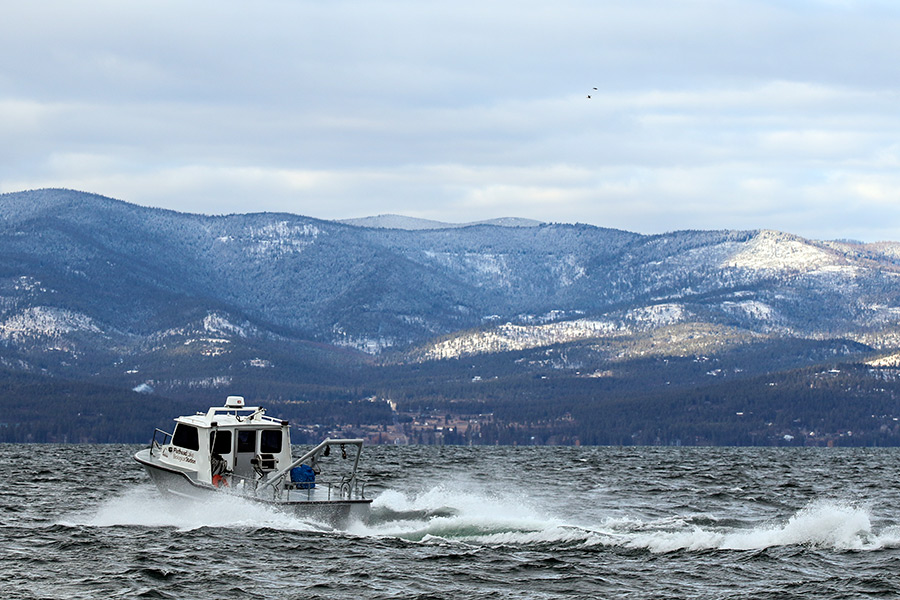CSKT Declares Emergency Resolution to Halt Invasive Mussel Spread
New efforts focus on boat inspections, aggressive testing to prevent spread to Flathead Lake
By Tristan Scott
Leaders of the Confederated Salish and Kootenai Tribes declared a formal emergency Dec. 20 to counter the potential spread of invasive mussel larvae into reservation waters and Flathead Lake, considered one of the cleanest lakes in the world.
CSKT’s resolution calls for the formation of an incident management team empowered to draw from all tribal resources. The declaration comes in response to the recent discovery of mussel larvae in Tiber and Canyon Ferry reservoirs east of the Continental Divide, as well as in the Milk River near Malta and the Missouri River near York’s Islands Fishing Access Site south of Townsend.
So far, the traces of contamination are restricted to the Missouri River Basin, but the potential for mussels to spread by clinging to the hulls of boats or persisting in the bilge water has risen dramatically.
The threat of mussel infestation hits especially close to home for those working to protect the waters of Flathead Lake and its surrounding network of rivers and creeks, and it comes to rest at the doorstep of the Columbia River Basin — the only major watershed in the West still believed to be free of quagga and zebra mussels.
“In order to best protect our many waters on the reservation and the southern half of Flathead Lake, we needed to take this action to focus our efforts,” Tribal Chairman Vernon Finley said. “We have been watching the zebra and quagga mussels spread closer to our lands and now they are in Montana. This is a matter we take very seriously.”
CSKT called for working in concert with the state’s Mussel Response Team and other non-governmental entities, like the Flathead Lake Biological Station at Yellow Bay.
“It’s often said, but this time it’s really true. We need to pull together as a team, everyone, to prevent invasive mussels from getting into our waters,” Rich Janssen, head of CSKT’s Natural Resource Department, said.
“Assets invested to prevent an infestation on the Reservation are well spent,” he continued. “Initial staff research and investigation has shown that the zebra and quagga mussels could have a greater than $90 million annual impact to our local economy. These mussels could cause our fishery to collapse, make swimming and drinking waters unusable, negatively affect wastewater treatment operations, impact tourism, as well as cause irrigation and hydropower costs to dramatically increase if they become established here. Our entire community needs to encourage local legislators to take action as soon as possible.”
The public should expect to see increased activity in terms of enhanced monitoring efforts, public outreach and public education. People need to inspect their boats and any watercraft used in other waters, including kayaks, canoes, paddle boards, and even waders, he said.
On Nov. 30, Gov. Steve Bullock announced a statewide natural resource emergency for Montana water bodies, and a day later, state agencies imposed restrictions on the two reservoirs where the species have turned up.
The Montana Mussel Incident Response Team was also formed earlier this month in response to the threat.
Led by Matt Wolcott of the Department of Natural Resources and Conservation and Randy Arnold of Montana Fish, Wildlife and Parks, the team reported on Dec. 22 that it has processed 610 water samples from 182 water bodies with no new positive detections.
“It’s really good news but our response is not over,” Charlie Sperry, FWP’s responsive management supervisor, said. “Spring sampling and monitoring will be critical.”
Meanwhile, efforts are underway to study whether Flathead Lake has been infested with mussels, with biologists from CSKT and the Flathead Lake Biological Station leading the charge.
Janssen said CSKT and the research station culled samples from 117 sites across Flathead Lake and are awaiting lab eDNA results from the University of Montana.
“It’s critically important for us to protect our resources on the reservation, especially Flathead Lake,” Janssen said. “Literally the last thing we need is quagga or zebra mussels to turn up here.”